#World tree
Explore tagged Tumblr posts
Note
What information do we have on the "world tree"? I think marcille mentions that ambrosia was made from its roots, but that's all I remember
Thanks!
I think thats the only mention of it, I don't remember it being mentioned anywhere else
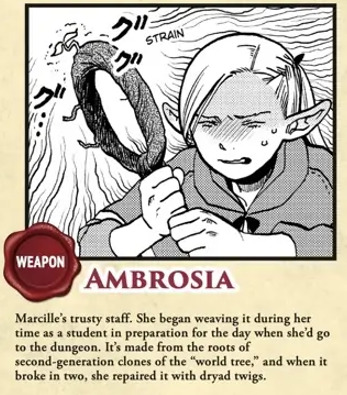
159 notes
·
View notes
Text

My own map of Yggdrasil from Norse mythology. Inspired by the art of Hilma Af Klint and Manly P. Hall
Key (in case the writing's too hard to make out):
1. Alfheim. 2. Asgard. 3. Vanaheim. 4. Midgard. 5. Jotunheim. 6. Nidavellir. 7. Svartalfheim. 8. Niflheim. 9. Muspellheim
#arlequine lunaire#verthandi in the middle#yggdrasil#norse mythology#norse paganism#world map#nine realms#art#artists on tumblr#drawing#traditional art#character design#small artist#queer artist#audhd artist#colored pencil#pen and ink#pen and pencil#mythology#world tree#landscape
122 notes
·
View notes
Text

The World Tree - Janne Erkkilä , 2015.
Finnish, b. 1986 -
Acrylic on canvas, 144 x 89 cm.
318 notes
·
View notes
Text

Another runestone sketch for the Poetic Edda - Odin suspended on the world tree and pierced with a spear, perceiving the runes below at the center of the nine realms.
108 notes
·
View notes
Text
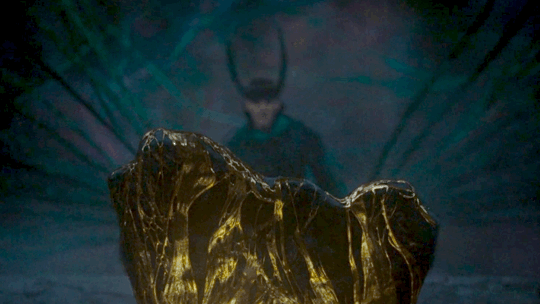
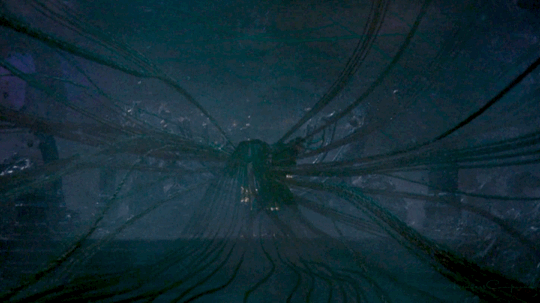
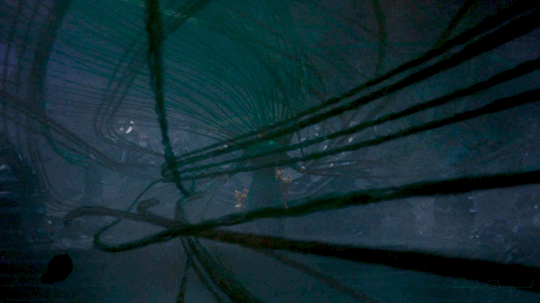
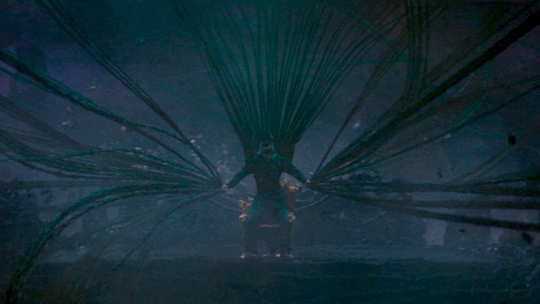
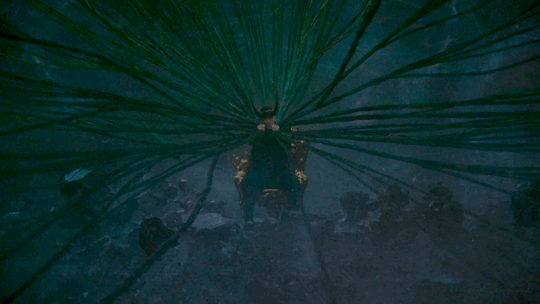
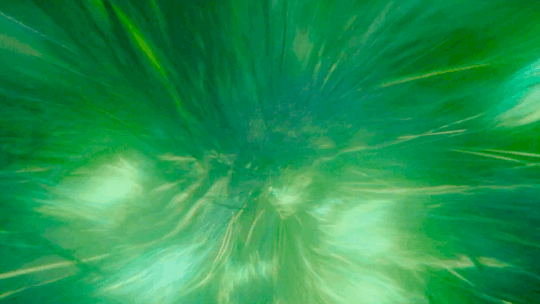

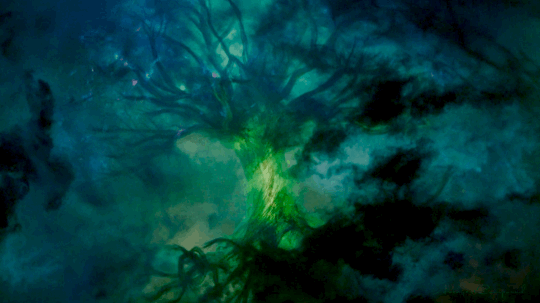
Loki | Season 2: Episode 6 - Glorious Purpose
#marvel#avengers#marveledit#mcuedit#lokiedit#loki#loki laufeyson#loki tb#loki spoilers#spoilers#disney+#disney plus#mcu#world tree#yggdrasil#marvel cinematic universe#199999#avengerscompoundedit#tom hiddleston#hiddles
669 notes
·
View notes
Text
Have you played World tree ?
By Bard Bloom and Victoria Borah Bloom

World Tree is a game about Anthropomorphic Animals on a world shaped like a giant - Possibly infinite - tree, with branches tens of miles thick and thousands long.
47 notes
·
View notes
Text
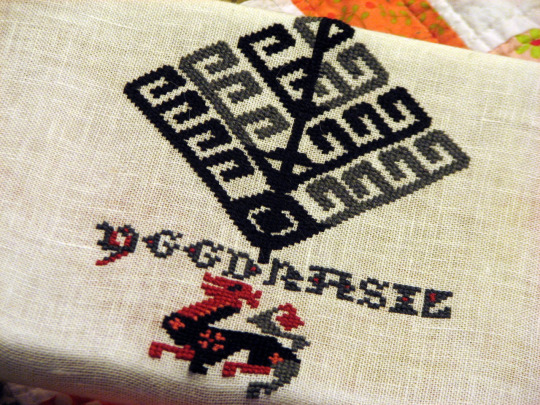


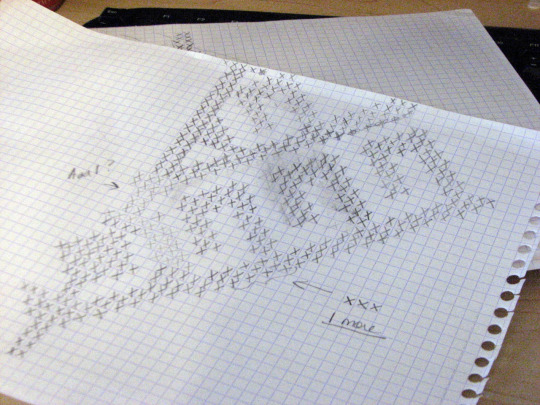
76 notes
·
View notes
Text
A Shamanic Perspective on Christmas

The holiday season, particularly Christmas, is often marked by an explosion of lights, gift-giving, festive meals, and heartwarming tales of togetherness. Yet beneath its modern trappings lies a profound spiritual essence that echoes the cycles of nature, the power of community, and the mysteries of the cosmos. From a shamanic perspective, Christmas can be viewed as an opportunity to honor the interconnectedness of life, the sacredness of light amid darkness, and the renewal of spirit.
The Winter Solstice: The Shamanic Origin of the Season
Before the Christianization of Europe, midwinter celebrations were deeply rooted in indigenous, earth-centered traditions. Many of these observances revolved around the winter solstice, the shortest day and longest night of the year. Shamanic cultures viewed this turning point as a sacred time when the Sun, symbolic of life and spirit, was reborn.
The solstice signifies the return of light, a moment of renewal and hope when the darkness of the year begins to recede. In shamanic practice, this event is a time for introspection and connection with the unseen forces that govern the cycles of life. Just as the Earth enters a period of stillness and regeneration, so too are individuals encouraged to journey inward, shedding the past year's burdens and planting seeds of intention for the coming one.
The themes of rebirth and illumination align beautifully with the Christian narrative of Christmas, particularly the birth of Christ, often depicted as the "light of the world." From a shamanic perspective, this light represents not only a divine presence but also the inherent light within every being--a reminder of our connection to the cosmos and each other.
The Tree of Life and the Symbolism of Evergreens
The Christmas tree, an iconic symbol of the season, has its roots in ancient shamanic traditions. Evergreen trees, which remain vibrant and alive even in the harshest winters, were revered as symbols of resilience, eternal life, and the continuity of existence.
For shamans, trees are sacred beings that connect the heavens, the Earth, and the underworld. Their roots delve deep into the soil, their trunks stand steadfast in the present, and their branches reach toward the sky. Decorating a tree during Christmas can be seen as a modern echo of this ancient reverence. The ornaments and lights represent the gifts of spirit and the illumination of consciousness, a reminder to celebrate life's beauty and mystery.
In a shamanic practice, you might sit with your tree and meditate on its energy. Consider what wisdom it has to offer about standing tall through adversity or offering shade and shelter to others. The tree, like humanity, exists in a delicate balance with its surroundings, embodying the interdependence of all living things.
The Spirit of Giving: A Sacred Exchange
Gift-giving is a cornerstone of Christmas celebrations, often seen as a reflection of love and generosity. From a shamanic perspective, the exchange of gifts mirrors the sacred reciprocity found in nature. Indigenous cultures recognize that life is sustained through a cycle of giving and receiving--what is taken from the Earth is returned in some form, whether through offerings, rituals, or acts of stewardship.
When giving gifts, consider the energy and intention behind them. A shamanic view encourages mindful giving, where the act itself is imbued with gratitude, thoughtfulness, and a sense of interconnectedness. It's not about the material value of the gift but the spirit in which it is given. Handmade items, meaningful tokens, or gifts of time and presence often carry the most profound energy.
Likewise, receiving is a practice in itself. In a culture that often prizes independence, learning to accept with grace and humility fosters connection and balance. Both giving and receiving are opportunities to acknowledge our shared humanity and the flow of abundance in our lives.
Connecting with Ancestors and Spirit Guides
Christmas is a time when families gather, creating traditions that bridge generations. From a shamanic perspective, this is also a powerful moment to connect with ancestors and spiritual guides. In many shamanic traditions, winter is a season when the veil between the physical and spiritual realms is thinner, making it easier to commune with those who have passed.
Setting aside time to honor your ancestors during the holiday season can be a deeply enriching practice. This might involve creating an altar with photographs, candles, or objects that represent your lineage. As you celebrate Christmas, you might include rituals that invite the wisdom and blessings of your forebears, recognizing their role in shaping who you are today.
Similarly, shamanic practices often involve calling on spirit guides for guidance and protection. Whether through meditation, drumming, or prayer, inviting these helpers into your Christmas rituals can deepen your sense of connection to the unseen world.
The Inner Light: A Journey of Rebirth
At its heart, Christmas is a celebration of light. From the sparkling lights on homes and trees to the symbolic light of Christ, this season reminds us of the enduring power of illumination. For shamans, light is a metaphor for consciousness, healing, and the divine spark within all beings.
This season is an invitation to rekindle your inner light. Shamanic journeying, a practice of entering a trance state to access spiritual realms, can be particularly potent during this time. Through such journeys, you might seek insights about the year ahead, release lingering shadows, or connect with your higher self. The goal is not only personal transformation but also contributing your light to the collective.
Rekindling the Spirit of Christmas
Modern Christmas celebrations can sometimes feel disconnected from their spiritual roots, overshadowed by consumerism and obligation. A shamanic perspective offers a way to reconnect with the season's sacred essence by emphasizing presence, gratitude, and harmony with nature.
This Christmas, consider integrating shamanic elements into your celebrations. Spend time in nature, honoring the cycles of the Earth. Light a candle in recognition of the returning Sun. Reflect on the gifts of life, love, and community that sustain you. And most importantly, nurture the light within you, allowing it to shine brightly as a beacon of hope and connection.
In doing so, you honor not only the traditions of the past but also the universal truths that transcend cultures and time: that we are all interconnected, that light follows darkness, and that the spirit of Christmas lives in the timeless dance of renewal and love.
#shamanism#shamanic practice#shamans#christmas#winter solstice#spirituality#holiday season#tree of life#world tree
30 notes
·
View notes
Text
Ashwood Trees
Properties: Rebirth, mysticism, magic, enchantment, transformation, destiny, femininity, balance, the ocean, prophetic dreams, weaving, prosperity, protection, healing, love, the world tree, Amirdrassil Deities: Mother Moon, Mu'sha, Aviana, Aessina, Ohn’ahra, Q’onzu, Shadra, Mazu Elements: Water, Air, Spirit Guardians: Dryads, owls, ravens, spiders, faerie dragons, wildkin, wisps Moon Phase: Waxing
The World Mother Ash is one of the most sacred trees to Druids. It forms a triad with Oak and Thorn (often represented by Hawthorn or Blackthorn or both depending on practice). It is also considered by many to be the divine feminine counterpart to the divine masculine Oak in this triad and thus is heavily associated with the Mother Moon and G’hanir. In some Kaldorei Druidic theories of thought the Ash represents the greater cosmic world tree or the center of the universe by which all planes of reality connect. Some Druids of the Moon take this theory further still and claim that Elune Herself is this center figure of the universe through which all planes are connected thereby making Her the cosmic world tree itself through which all things are balanced.
In this practice, invoking the phases of Elune allows druids to “traverse” the cosmic world tree. By invoking her brightest phases one may travel up into the Dream or the boughs of this cosmic world tree or access the plane of water or air. In theory, invoking Elune’s darker phases may allow one to access the darker realms of the Dream like the Blighted Lands by descending this cosmic tree to the darker roots of Death, Shadow, and Decay. Since the blooming of Amirdrassil, the new world tree’s connections between life and death has reinvigorated this discussion of the cosmic world tree model as the tree serves as a perfect example for the theory by linking two realms to one another through reality itself.
Since the Nightmare’s defeat in the Legion invasion and the Cenarion Circle’s ongoing talks with the Thornspeakers of Kul Tiras, discussion of these darker branches and roots of the tree of life are becoming more common while still hushed in Nighthaven. Especially with these new reports of this “Unseeming” from the Isle of Dorn. Many fear it may be yet another dark root of the cosmic world tree that has remained undiscovered or the possibility that the Nightmare was much more deeply rooted in the Dream far earlier than we first believed.
Some scholars of this theory speculate that Lake Elune’ara or the Rift of Aln may be the transition point to the “darker” roots of the cosmos or to areas of the Dream like Thros. The Lake and its pure waters serve as the reflection of Elune’s brightest phases and the Rift its counter reflection in shadow. It’s speculated then that the presence of the Twisting Nether and the Great Dark Beyond in the Rift serves as the chaotic flow of spirit and decay through the cosmos as the two elements do in the trees of reality - the macro scale of the cosmos reflected in the trees of our world. In both Shamanic tradition and the magical study of Telemancy the Twisting Nether serves as a method to travel between the planes therefore in the cosmic world tree model the Twisting Nether may serve as its branches, trunk, and roots through which the cosmos may be explored and similarly with the Great Dark Beyond. While a somewhat heretical thought to those of the Eluntie faith, this model of thought suggests that the Twisting Nether and Great Dark Beyond are just as much a part of Elune Herself as any other force. Just as She shifts between light and dark so too is the Twisting Nether a place where Light and Void clash and as a Goddess of Balance the Great Dark Beyond would be yet another reflection still.
The curious Loa Q’onzu has seen a slight rise in worship in Nighthaven. Their claimed ability to traverse between planes has given them a new association with the Ashwood tree as this symbol of the great cosmic world tree.
Ashwood Lumber Properties and Uses Because of these associations with Elune and the cosmos some Ashwood trees are considered to be “moontouched” or “star touched.” Wildkin, wisps, dryads, and faerie dragons are often drawn to old growth Ashwood trees. When any of these gather in great numbers around an Ashwood or a grove this is how woodworkers know the tree and area is “moontouched” or “star touched.” The wood of these trees naturally retains astral and restorative magics absorbed from the environment and requires almost no enchantment to access this magic. Because of this the lumber is used in the creation of wands, magical staves, enchanted bows,and in other magical and ceremonial uses. The preferred Kaldorei method of harvesting the wood is from already fallen Ashwood trees or through the help of wisps to harvest wood without hurting the tree.
Because of these natural astral and restorative qualities many associate the tree with G’hanir, the Mother Tree, Aviana, and Aessina. Many druidic healers and Sisters of Elune chose to have staves or other instruments crafted from Moontouched or Startouched Ashwood because it serves as a natural powerful focus to the power of the Dream or the Goddess and is seen as natural source of power and a gift of the Goddess. Ashwood seeds may also be used by powerful druidic healers to bring the spirit back to fallen party member in battle. In doing so the seed and its latent restorative magic is consumed.
Kaldorei Sailors often widdle effigies or idols of a crescent moon from Ashwood to protect them while at sea. The token is either left at a moonwell, a temple, or worn on their person in hopes that the Goddess grants them calm seas.
Effigies of Ohn’ahra or Mu’sha are also carved from limbs of Ashwood trees that have fallen in storms or great gusts of wind. The fallen wood is said to capture that potent energy and channel the power of the Loa or the whispers of Mu’sha for the Earth Mother to hear.
The wood of an ash tree can be woven into baskets, dreamcatchers, and many other wards, runes, etc. Because of this weaving quality many associate it with Lady Sathrah and in some Troll traditions it is associated with the spider Loa Shadra as well.
Rituals of the Ashwood - In many groves the Ashwood is carved with spirals to symbolize the tree's connection to the Dream and possibly to the greater cosmos. - Sleep with fresh Ashwood leaves to stimulate prophetic dreams or to aid in accessing the Dream or or to dreamwalk. - Wood from an Ashwood tree is used to create wards against scrying, divination, or dreamwalking.
- Incense created from this wood is used in rituals related to astral projection in reality or to other planes through the Twisting Nether.
- Water collected from beneath an Ash tree is said to be protective against negative energies, enchantments while raising healing ones and fight off illness.
- Tonics and beverages can be made from Ashwood and take on many of its properties.
#rebirth#divination#emerald dream#ardenweald#G'hanir#Mother Moon#Aviana#Aessina#Q'onzu#Spirit#Air#Water#mysticism#magic#enchantment#transformation#destiny#femininity#divine feminine#balance#ocean#prophetic dreams#weaving#Ashwood#prosperity#protection#healing#love#world tree#shadra
10 notes
·
View notes
Text
26 notes
·
View notes
Text

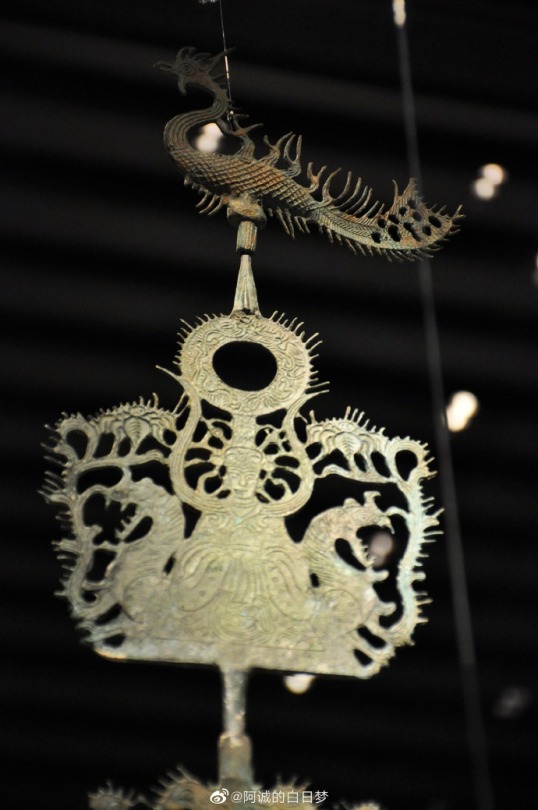
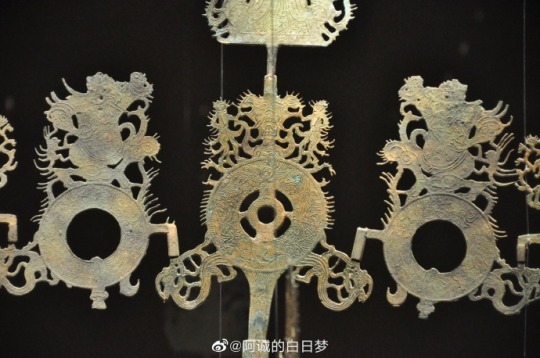


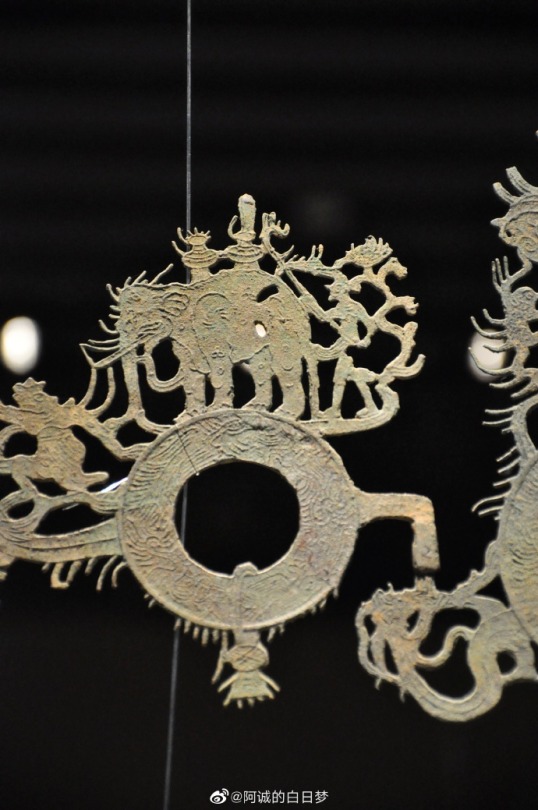
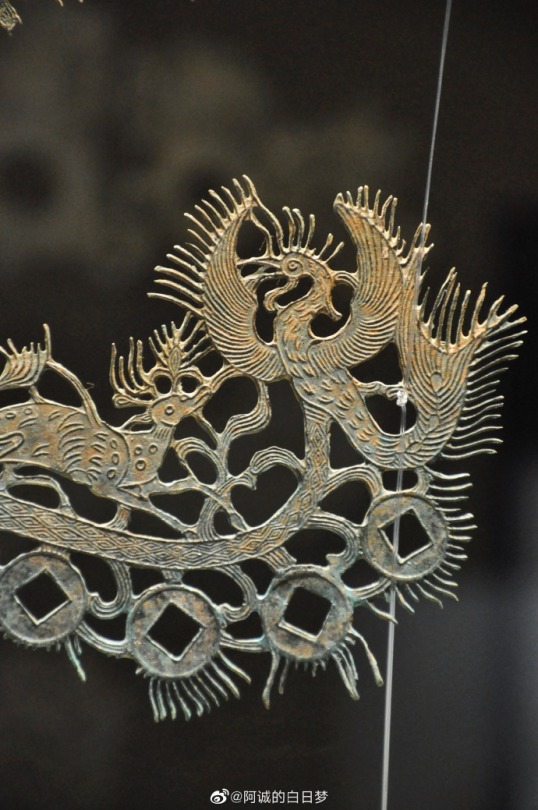
Han Dynasty Bronze Money Tree
The most cherished human dream is cast in bronze – the dream of money growing on trees.
Chinese custom associates the money tree with abundance and prosperity. The money tree as a burial item served to ensure that the deceased continue to prosper in the afterlife. Elephants laden with wealth roam along the branches emanating from the trunk. The ensemble of auspicious figurines refers to all kinds of blessings.
Pecuniary symbolism is combined with pretty archaic depictions of phoenixes and taotie-like (饕餮) imagery. The treetop Phoenix is a later modification of the Solar Raven, so the artifact becomes more and more related to the World Tree.
On display in Mianyang Museum (綿陽博物館), Sichuan.
Photo: ©阿诚的白日梦
#chinese art#ancient china#chinese culture#chinese mythology#bronze design#bronze art#bronze#han dynasty#tomb art#mythical creatures#money tree#wealth#coins#talisman#phoenix#prosperity#feng shui#world tree
59 notes
·
View notes
Text
The Bloom
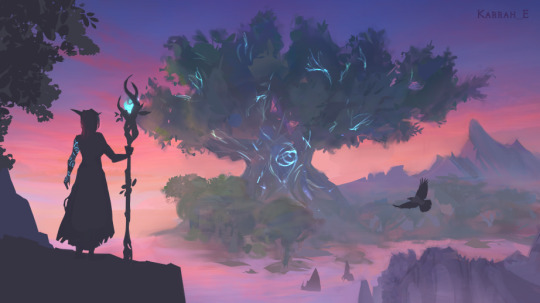
Kyuusei at Amirdrassil, a Warcraft silhouette commission for the lovely @kyuusei-shadowleaf
#world of warcraft art#karraheart#karrahe#art#world of warcraft#amirdrassil#kaldorei#night elf#warcraft art#world tree
136 notes
·
View notes
Text
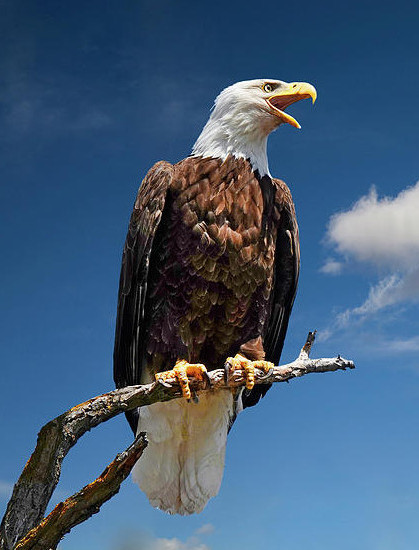
Legends and myths about trees
World tree - the source of wisdom of the ages
The world tree is a motif present in several religions and myths around the world. It is represented as a colossal tree which supports the heavens, thereby connecting the heavens, the terrestrial world, and, through its roots, the underworld.
Many Eurasian mythologies share the motif of the "world tree", "cosmic tree", or "Eagle and Serpent Tree". More specifically, it shows up in "Haitian, Finnish, Lithuanian, Hungarian, Indian, Chinese, Japanese, Norse, Siberian and northern Asian Shamanic folklore".
The World Tree is often identified with the Tree of Life, and also fulfills the role of an axis mundi, that is, a centre or axis of the world. It is also located at the center of the world and represents order and harmony of the cosmos. Each part of the tree corresponds to one of the three spheres of the world (treetops - heavens; trunk - middle world or earth; roots - underworld) and is also associated with a classical element (top part - fire; middle part - earth, soil, ground; bottom part - water).
Its branches are said to reach the skies and its roots to connect the human or earthly world with an underworld or subterranean realm. Because of this, the tree was worshipped as a mediator between Heavens and Earth. On the treetops are located the luminaries (stars) and heavenly bodies, along with an eagle's nest; several species of birds perch among its branches; humans and animals of every kind live under its branches, and near the root is the dwelling place of snakes and every sort of reptiles.
A bird perches atop its foliage, "often .... a winged mythical creature" that represents a heavenly realm. The eagle seems to be the most frequent bird, fulfilling the role of a creator or weather deity. Its antipode is a snake or serpentine creature that crawls between the tree roots, being a "symbol of the underworld".
The imagery of the World Tree is sometimes associated with conferring immortality, either by a fruit that grows on it or by a springsource located nearby. In some descriptions this "water of life" may also flow from the roots of the tree.
The world tree was an important element in shamanistic worldview as well, and it is said that the giant bird ... hatches shamans in the branches of the World Tree.
Some species of birds (eagle, raven, crane, loon, and lark) are revered as mediators between worlds and also connected to the imagery of the world tree. Another line of scholarship points to a "recurring theme" of the owl as the mediator to the upper realm, and its counterpart, the snake, as the mediator to the lower regions of the cosmos.
Northern Eurasian and Central Asian traditions wherein the World Tree is also associated with the horse and with deer antlers which might resemble tree branches.
Some scholars have pointed out that, from the perspective of evolutionary biology, the concept of a world tree may have originated in human thought. This is because our ancestors lived in trees for about 60 million years, and for them the trees were everything in the world. This is why the collective unconscious that the world is made of giant trees has remained with us to the present day.

木にまつわる伝説・神話
世界樹 〜 時代の叡智の源
世界樹は、世界中の宗教や神話に見られる概念、モ���ーフである。天を支える巨大な木として表現され、それによって天と地上世界、そしてその根を通して冥界をつないでいる。
多くのユーラシア神話が「世界樹」「宇宙樹」「鷲と蛇の樹」というモチーフを共有しているとされている。具体的には、「ハイチ、フィンランド、リトアニア、ハンガリー、インド、中国、日本、北欧、シベリア、北アジアのシャーマン伝承」に見られる。
世界樹はしばしば生命の樹と同一視され、また、世界軸、つまり世界の中心や軸の役割を果たす。また、世界の中心に位置し、宇宙の秩序と調和を表している。樹木の各部分は世界の3つの圏(梢-天、幹-中世界または地、根-地下世界)のいずれかに対応し、古典的な元素(上部-火、中部-地、土、地面、下部-水)にも関連している。
その枝は天空に届き、根は人間界や地上界と地下世界や地底界をつなぐと言われている。そのため、この木は天と地を結ぶ媒介として崇拝された。梢には星や天体があり、鷲の巣がある。枝には数種類の鳥がとまり、枝の下には人間やあらゆる動物が住み、根の近くには蛇やあらゆる爬虫類が住んでいる。
その葉の上にとまる鳥は、「しばしば......翼を持つ神話上の生き物」であり、天界を表す。鷲は最も頻繁に見られる鳥で、創造主や天候の神の役割を果たしているようだ。その対極にあるのは、木の根の間を這う蛇や蛇のような生き物で、「冥界の象徴」である。
世界樹のイメージは、そこに生る果実や近くにある泉によって不老不死をもたらすことと関連付けられることもある。この「生命の水」は木の根からも湧き出るという記述もある。
世界樹はシャーマニズムの世界観においても重要な要素であり、「巨大な鳥は......世界樹の枝でシャーマンを孵化させる」ともいわれている。
いくつかの種の鳥(ワシ、ワタリガラス、ツル、ハシビロコウ、ヒバリ)は、世界をつなぐ媒介者として崇められ、世界樹のイメージとも結びついている。また、別の研究では、フクロウは天上界への媒介者であり、それと対をなすヘビは宇宙の下界への媒介者であるという「繰り返されるテーマ」が指摘されている。北ユーラシアや中央アジアの伝統では、世界樹は馬や、木の枝に似た鹿の角とも関連づけられている。
一部の学者��、進化生物学の観点から、世界樹という概念が人類の思考の中に元から備わっている可能性を指摘している。というのも、人類の祖先は約6000万年にわたり樹上で生活しており、その時代の彼らにとっては木々こそが世界のすべてであったと考えられるからである。そのため、この世界は巨大な木で出来ているのだという集合的無意識が、現在の我々に至るまで残っているのだというものである。
#trees#tree legend#tree myths#legend#mythology#folklore#world tree#bird#tree of life#water of life#sharamanism#nature#art#source of wisdom
152 notes
·
View notes
Text

The dragon tympanum of the St. James Chapel of the Saint Michael's Church in Sopron, Hungary.
The ‘égig érő fa’ (‘sky-high tree’) is a tree from Hungarian folklore: there exists in the world a wonderful tree with nine jutting branches that, as they churn, send out gusts of wind. So marvellous is this tree that both the Moon, and the Sun can pass freely through its branches. The fabulous tree, protected by dragons, grows in a place only one skilled in the art can find: the average person may hear word of it, but can never see it.
#égig érő fa#sky high tree#hungarian folklore#hungarian folk tales#hungarian fairy tales#fairy tales#folk tales#folklore#életfa#tree of life#világfa#world tree#tetejetlen fa#tree without a top#mythological trees#trees in folk tales#mythical trees#mythology#hungarian mythology#mythical#mythological art#mythological figure#mythological stories#illustration#art#arte#kunst#dragons#tympanum
16 notes
·
View notes
Text
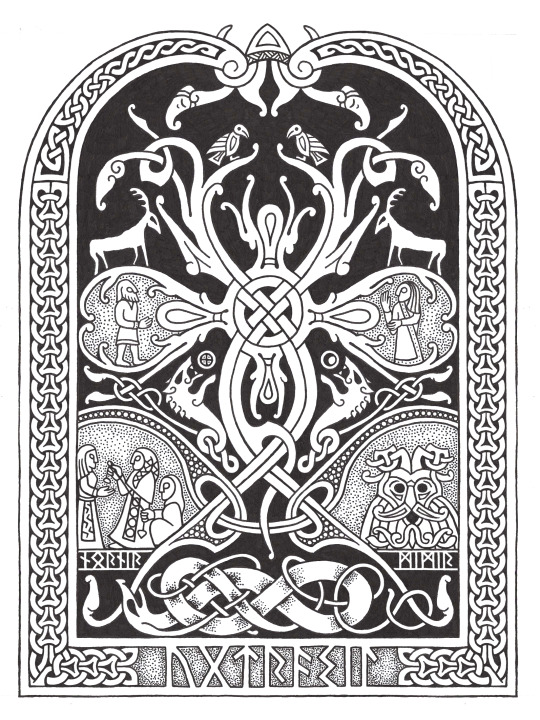
A Yggdrasil sketch - one of the runestone pages for the Poetic Edda project.
#medieval#norse#viking#knotwork#calligraphy#norse mythology#world tree#yggdrasil#norns#mimir#runestone#runes
69 notes
·
View notes